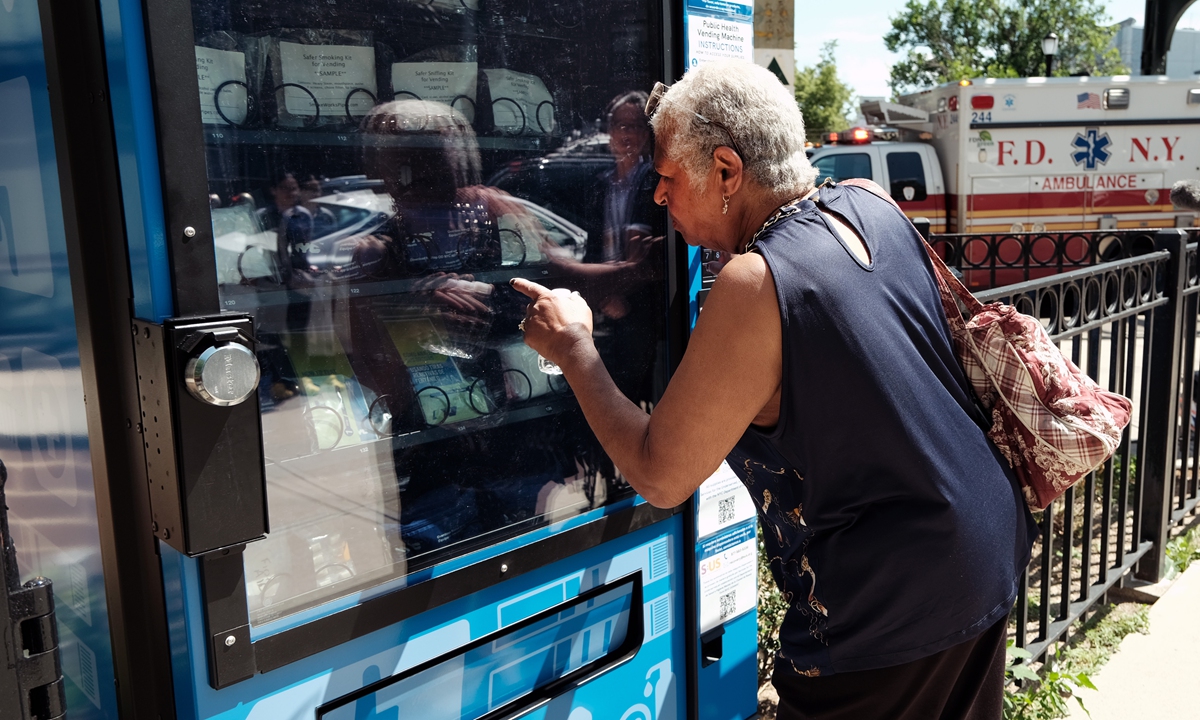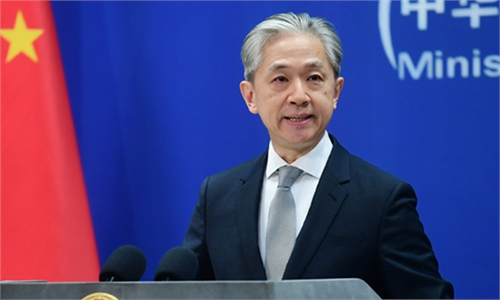China's National Narcotics Laboratory to leverage its technical support role in China-US drug control cooperation

A man uses a new vending machine in Brooklyn that will disperse fentanyl test strips and naloxone as well as hygiene kits, maxi pads, Vitamin C, and COVID-19 tests for free on June 5, 2023 in New York City. Photo: VCG
China's National Narcotics Laboratory will leverage its technical support role in bilateral drug control cooperation between China and the US, the Global Times learned on Thursday, after recent close interactions on drug control between Chinese and American senior officials. The technical director of the laboratory hoped to restore previous pragmatic and efficient cooperation status between the two countries.
China's State Councilor and Minister of Public Security Wang Xiaohong and US Homeland Security Secretary Alejandro Mayorkas met in Vienna, Austria on Sunday local time, discussing bilateral cooperation on drug control and law enforcement.
The Chinese minister said he hopes that the two sides will uphold the principles of mutual respect, peaceful coexistence and win-win cooperation, respect each other's core interests and major concerns, and remove obstacles to bilateral drug control and law enforcement cooperation and people-to-people exchanges.
This is the second high-level meeting between China and the US on drug control and law enforcement cooperation within a month. Previously on January 30, Wang met with Deputy Assistant to the President and Deputy Homeland Security Advisor Jen Daskal, leading a joint US drug control delegation in Beijing, and announcing the official launch of the China-US drug control working group. In addition, on January 22, Chinese Ambassador to the US, Xie Feng, discussed drug control cooperation in his meeting with Director of the White House Office of National Drug Control Policy Rahul Gupta.
Hua Zhendong, technical director of the National Narcotic Control Commission's National Narcotics Laboratory, said the laboratory will fully leverage its technical support role in bilateral drug control cooperation.
The technical director noted that the laboratory will serve the national public security, customs, and postal departments, conducting comprehensive analysis of suspicious items found in imported and exported goods and parcels to provide support for accurately determining the composition and effects of substances.
In addition, the laboratory has already added various newly discovered chemicals that can be used to produce drugs, including various fentanyl precursors listed in the US list of chemicals used in drug production, to the master database for screening nuclear magnetic resonance (NMR) spectroscopy.
"The next step will explore the use of Internet of Things technology to achieve real-time uploading and online comparison of spectra collected by nuclear magnetic resonance spectrometers nationwide, further enhancing the ability to discover relevant substances."
The US has five percent of the world's population, but consumes 80 percent of the world's opioids, but still has not permanently scheduled fentanyl-related substances as a class. There are also drug injection sites in many parts of the country, and even Hunter Biden, the son of President Joe Biden, has tested positive for drugs, media reports said.
In the media release after the meeting between Wang and Mayorkas from the Chinese side, Wang urged the US to correct the mistake of listing China as a "major drug source country."
Hua told the Global Times that in recent years, the US has experienced a serious crisis of fentanyl abuse, but the root cause lies entirely within the US itself, especially the relaxation of controls over opioid prescription drugs, leading to a large number of addicted individuals. "In line with a humanitarian and responsible attitude, China actively promotes the strengthening of control over fentanyl-related substances."
Fentanyl is an opioid painkiller that has rapidly become the leading cause of overdose deaths in the US in recent years, accounting for more than two-thirds of drug-related fatalities. In fulfilling its responsibility to actively participate in global drug governance and maintain world security and stability, on May 1, 2019, China officially classified fentanyl-related substances, making it the only country in the world to do so.
The practice of distorting facts is clearly detrimental to and even hinders the development of drug control cooperation between China and the US. The National Drug Laboratory of the country that was once sanctioned by the US is the most obvious example.
In May 2020, the US Department of Commerce included the Institute of Forensic Science of China's Ministry of Public Security (including the National Narcotics Laboratory address) in the "Entity List" and had it removed on November 16, 2023 in pursuant to implementing the consensus of the San Francisco meeting.
The US inclusion of the laboratory in the "Entity List" had greatly affected the normal conduct of experimental research. This is not only detrimental to China's anti-drug work, but also to that of the US, Hua noted, with the hope of restoring the previous pragmatic and efficient cooperation status in order to provide more powerful technical support for drug control cooperation between the two countries.

